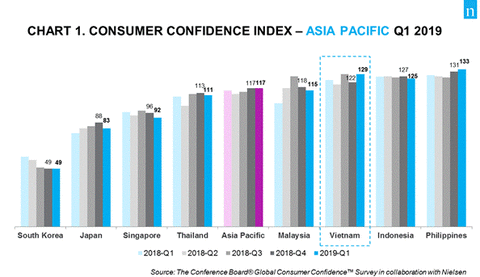
Consumer confidence index in the Asia Pacific in the first quarter of this year. — Photo Nielsen Vietnam
Viet Nam surpassed Indonesia to rank third in consumer confidence in the first quarter behind only the Philippines and India, according to the latest Conference Board Global Consumer Confidence Survey conducted in collaboration with global measurement company Nielsen.
With a seven point increase from the fourth quarter last year, Viet Nam hit a record 129 points in the Consumer Confidence Index (CCI).
Viet Nam’s was the biggest gain in the Asia Pacific.
Globally and in the region the CCI was steady, respectively edging down by one point and rising by one point from Q4 last year.
Viet Nam’s overall confidence level was high above the regional average (more than 12 points above).
The Philippines (133 points) and India (132) topped the highest CCI.
Singapore saw the biggest decline of four points and finished the quarter with 92.
Viet Nam’s strong rise was due to the confidence in job prospects and personal finances, and the level of willingness to spend by the population.
“This significant increase in consumer confidence indicates that consumers continue to see positive changes for themselves and their families,” Nguyen Huong Quynh, managing director of Nielsen Vietnam, said.
“Manufacturers and retailers need to capture the latest trends in the consumer market and need to act faster to respond to the evolving needs of consumers.”
During the first quarter, all key drivers of Viet Nam’s CCI, including job prospects, financial security and willingness to spending, increased significantly.
Approximately three-quarters of the people surveyed believed they have good or excellent job prospects.
Eighty two per cent of respondents said they would be in good or excellent financial state in the next 12 months.
Sixty seven per cent said they were ready to spend, an increase of 4 percentage points.
Vietnamese consumers continued to rank job security and health as two factors they care the most about, followed by economic growth and work-life balance. — VNS